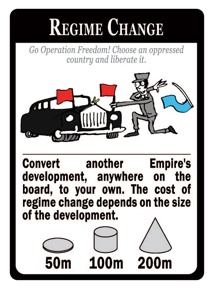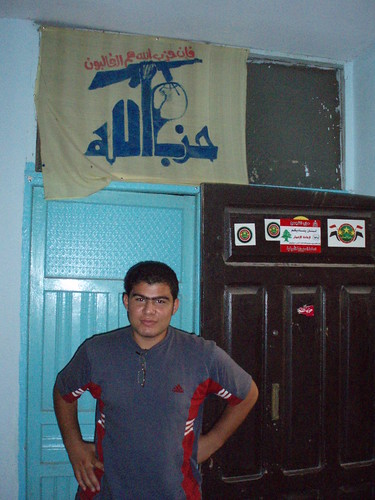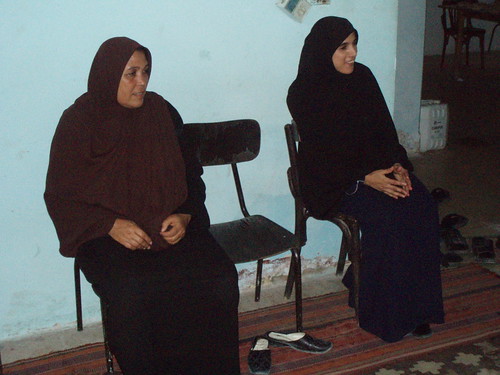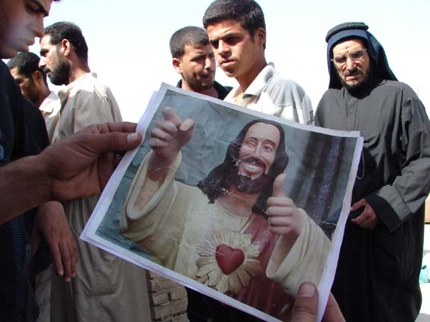Month: October 2006
War on Terror: the board game
The goal of War on Terror, the boardgame is to liberate the world, ridding it of fear and terrorism forever. Naturally, only the biggest and strongest Empires are up to this task and so a certain amount of dominance needs to be shown. Alternatively, you can play as the terrorists, fighting for a world without empires.
. . .
Empires soon strike up alliances and the propaganda war is in full flow – secret messages have been sold for over 100m in previous games. The games sway between paranoid pacts and all out war. Nukes get dropped and Empires soon find that sometimes you need to fund a bit of terrorism in order to eradicate a greater threat. Terrorists start to spread across the planet … dirty bombs are detonated … oil gets destroyed … the world slowly becomes a dangerous, radioactive mess.
Here’s what the boxed game looks like:
From its board (below), it looks a bit like Risk.

To give you a taste of what it’s all about, check out some of the game’s playing cards below:
28,000 per square km
Sinai torture fields
While I was there, I decided to visit the Tagammu Party office, located in downtown Arish, to follow up on the case of detained Kefaya activist Hassan Abdallah, the coordinator of Sinai Youth For Change.
State Security agents broke into Hassan’s house in Arish last month, and kidnapped him. Later, they issued death threats against his two brothers Wael and Mohamed who have taken refuge in the Tagammu office, and have been staging a continuous sit-in.
At the office, I was met by veteran leftist activist Ashraf Ayoub, who’s been civil rights and pro-Palestinian campaigner in Arish since 1984, his 19-year-old son and Sinai Youth For Change activist Shadi, Hassan’s two brothers, mother and sister.
Hassan and his family joined the Tagammu Party during the post-Taba bombings security crackdowns. Hassan’s mother, Kawthar, and his sister Soheir who works as a school teacher, led spontaneous demos by the mothers and women relatives of detainees to protest the widespread torture and kidnappings by State Security agents. They teamed up later with veteran activists like Ashraf Ayoub, and decided to become active members in the left-wing party branch.
“The threats never stopped,” Kawthar said. “State Security Colonel Essam Amer and Major Hussein Mansour told us several times to leave the party, but we refused.”
Hassan’s brother Wael, 22-year-old English literature graduate, had been detained by security 29 October, 2004, part of the mass crackdown on Arish. He was kept for three months at the State Security bureau in Arish, and another three months in Damanhour prison. He told me he was brutally tortured by interrogators, who stripped him off his clothes, threatened him with rape, suspended him from the ceiling with his hands tied to the back, applied electric shocks on several parts of his body—before releasing him saying, “Ma3lesh (never mind), you are not involved.”
The other brother Mohamed, a 32 year old school teacher, was also picked up by State Security on 7 December 2004, and detained for three months, where he received similar treatment.
The younger brother Hassan, attracted the security’s attention, while chanting “Down with Hosni Mubarak” during pro-Lebanese resistance demos in Arish last July.
“State Security officers phoned Hassan several times, with threats and intimidation to leave Tagammu and quit activism,” his mother Kawthar said.
Finally, State Security agents stormed the family’s house on the dawn of 7 September, while Hassan was asleep, his mother recalled. “He was asleep, in his underwear, when they grabbed him. He shouted requesting to see a judicial warrant. They told him, ‘We are State Security. We don’t need a warrant.'”
Hassan was taken in his underwear and thrown into the police van. He was not allowed to take his eyeglasses with him. His two brothers Wael and Mohamed were present in the house, but security agents were not interested in them. On the following day, State Security Major Hussein Mansour phoned in with more threats if the Abdallahs don’t cease their activism, and requested the two brothers to show up the SS Arish bureau for questioning, and to “bring clothes for their naked brother,” the mother said. The two refused, saying the officer’s actions were illegal. Fearing for their safety, the Abdallahs took refuge in the Tagammu office, and said if SS wanted them they could come and get them from the office. For a week, security forces used to raid their empty house every night and smash its furniture. They also told the mother several times her two sons were “considered fugitives now, and if they are seen anywhere in the streets they will be killed.”
Hassan was kept in State Security Arish bureau for a week, then he was transferred to Bourg Al-Arab prison, still without his clothes or eyeglasses–just his underwear, according to his mother, as State Security officers refused to receive the clothes and food his sister and his friend Shadi Ayoub tried to bring him while he was still locked up in Arish.
Hassan has not been presented to the prosecutor still, and his two brothers are still holed up in the Tagammu office for fear of their safety
Merchant of death
Stating the obvious – for once
These are naive observations, however: Israel missed and continues to miss opportunities to normalize relations with the Palestinians and with the Syrians not because of mental blocks, but rather because of domestic political considerations. Mahmoud Abbas and Bashar Assad are defined as non-partners not because Ehud Olmert and Amir Peretz have an emotional problem preventing them as partners in dialogue, but because they do not have the political power to do so. The real deterrent factor acting upon Israeli leaders, including Ehud Barak, Bejamin Netanyahu and Ariel Sharon, has come from within the domestic political system: They feared the residents of the Golan Heights and the West Bank settlers more than they did the plotting of Arafat, Hafez Assad and his son. Olmert and Peretz suffer from the same weakness.
There is no way of knowing whether Israel’s willingness to withdraw from the West Bank and the Golan Heights would result in reliable, long-term peace agreements, but it can be confirmed that Israel is largely responsible for the fact that such moves have not been seriously considered or formulated. Israeli governments since 1967 have preferred domestic tranquility over the possibility of unrest on the foreign fronts. Defining the Palestinian and Syrian enemies as non-partners is a direct consequence of that order of priorities.
I would add, as a non-Israeli observer, it is not clear to me that the opposition to changing Israel’s devastating policy towards the territories it occupies and the region at large is only among settlers. As a casual observer of Israeli politics and the Israeli media, it also seems like there’s plenty of support for a maximalist Israel from people within the 1967 borders. I hope I’m wrong.
Jesus, the hidden imam
Iraq-US-Shiites-Jesus-offbeat Iraq Sadr City residents insulted by ‘Buddy Jesus’
BAGHDAD, Oct 1, 2006 (AFP) – Iraqi Shiite residents of Sadr City expressed anger on Sunday over a picture of a grinning Jesus they mistook for a Shiite holy figure that appeared in their neighborhood following a joint US-Iraqi operation.
Residents found a picture of “Buddy Jesus” from the 1999 film “Dogma” posted in the streets, accompanied by a badly photocopied pamphlet bearing a crude approximation of a US military crest and outlining a US “plan” to subjugate the area.
“That picture abuses our Imam Mahdi and his holy character, and mocks our sacred figures,” said resident Abu Riyam, apparently mistaking the satirical movie still of Jesus for one Shiism’s historical imams, whose images adopt a Jesus-like iconography.
The grinning, winking model of Buddy Jesus giving a thumbs-up sign appeared in the comedic film as a fictional attempt by the Catholic Church to present a kinder, more accessible image of Christianity.
“If it wasn’t so serious, it would be funny,” said a coalition spokesman Major Will Willhoite.
The pamphlets outlined a plan to discredit the militias in the sprawling two million person Baghdad slum, a stronghold of radical Shiite cleric Moqtada al-Sadr.
“Destabilize security in the militia areas with explosions and assassinations to create panic” and “killing, raping and kidnapping women” were all measures the pamphlet recommended for causing people to lose faith in the militias.
“Do not tell the suspect militias of these plans but keep them among friendly forces,” admonished the pamphlet.
The US military did not confirm that it had conducted a raid into Sadr City in the early hours of the morning, but said that an Iraq force with coalition advisors did conduct an operation in “northeast” Baghdad.
Much of Baghdad’s violence has been laid at the feet of Shiite militias, many of whom are based in Sadr City, but US forces have yet to enter the neighborhood in force.
And here’s the poster:
Always look on the bright side of life
On June 18, 2003, Jay Garner went to see Defense Secretary Donald H. Rumsfeld to report on his brief tenure in Iraq as head of the postwar planning office. Throughout the invasion and the early days of the war, Garner, a retired Army lieutenant general, had struggled just to get his team into Iraq. Two days after he arrived, Rumsfeld called to tell him that L. Paul “Jerry” Bremer, a 61-year-old terrorism expert and protege of Henry A. Kissinger, would be coming over as the presidential envoy, effectively replacing Garner.
“We’ve made three tragic decisions,” Garner told Rumsfeld.
“Really?” Rumsfeld asked.
“Three terrible mistakes,” Garner said.
He cited the first two orders Bremer signed when he arrived, the first one banning as many as 50,000 members of Saddam Hussein’s Baath Party from government jobs and the second disbanding the Iraqi military. Now there were hundreds of thousands of disorganized, unemployed, armed Iraqis running around.
Third, Garner said, Bremer had summarily dismissed an interim Iraqi leadership group that had been eager to help the United States administer the country in the short term. “Jerry Bremer can’t be the face of the government to the Iraqi people. You’ve got to have an Iraqi face for the Iraqi people.”
Garner made his final point: “There’s still time to rectify this. There’s still time to turn it around.”
Rumsfeld looked at Garner for a moment with his take-no-prisoners gaze. “Well,” he said, “I don’t think there is anything we can do, because we are where we are.”
He thinks I’ve lost it, Garner thought. He thinks I’m absolutely wrong. Garner didn’t want it to sound like sour grapes, but facts were facts. “They’re all reversible,” Garner said again.
“We’re not going to go back,” Rumsfeld said emphatically.
Later that day, Garner went with Rumsfeld to the White House. But in a meeting with Bush, he made no mention of mistakes. Instead he regaled the president with stories from his time in Baghdad.
In an interview last December, I asked Garner if he had any regrets in not telling the president about his misgivings.
“You know, I don’t know if I had that moment to live over again, I don’t know if I’d do that or not. But if I had done that — and quite frankly, I mean, I wouldn’t have had a problem doing that — but in my thinking, the door’s closed. I mean, there’s nothing I can do to open this door again. And I think if I had said that to the president in front of Cheney and Condoleezza Rice and Rumsfeld in there, the president would have looked at them and they would have rolled their eyes back and he would have thought, ‘Boy, I wonder why we didn’t get rid of this guy sooner?’ “
“They didn’t see it coming,” Garner added. “As the troops said, they drank the Kool-Aid.”
There’s also some very interesting passages about the influence Henry Kissinger has had over Dick Cheney, notably pressing the argument that US troops should stick it out in Iraq and defeat the insurgency militarily before leaving. According to Woodward, Kissinger sees Iraq as another Vietnam, and thinks that Vietnam could have been won if the US had stayed longer. Senior military officials completely disagreed with this view, saying “we’ve got to get the fuck out.”
Finally, former White House Chief of Staff seems to have had a pretty accurate reading of the situation, even if he was unwilling to actually internalize it:
Card put it on the generals in the Pentagon and Iraq. If they had come forward and said to the president, “It’s not worth it,” or, “The mission can’t be accomplished,” Card was certain, the president would have said “I’m not going to ask another kid to sacrifice for it.”
Card was enough of a realist to see that there were two negative aspects to Bush’s public persona that had come to define his presidency: incompetence and arrogance. Card did not believe that Bush was incompetent, and so he had to face the possibility that, as Bush’s chief of staff, he might have been the incompetent one. In addition, he did not think the president was arrogant.
But the marketing of Bush had come across as arrogant. Maybe it was unfair in Card’s opinion, but there it was.
He was leaving. And the man he considered most responsible for the postwar troubles, the one who should have gone, Rumsfeld, was staying.
Even The Economist, which in 2002/2003 was largely pro-war and pro-Bush (and is now eating humble pie), had called for Rumsfeld to resign on its cover. One of the lessons of the Bush presidency will be that, as well as all the corruption, pork-barreling for big industry and ideological blindness, Bush’s personality will have been a key to his policy failures: he is a man unable to admit mistakes or consider that he may have been wrong. He confuses arrogance and groundless optimism with dogged resolve. You can imagine these meetings with the president, surrounded by his favorite yes-men, singing the Monty Python song “Always look on the bright side of life” in unison as they are delivered pessimistic report after pessimistic report from the uniformed professionals in Iraq. What a catastrophe.
Torpedo the 14 Dem sell-outs
What people need to do now is punish the Democrats who voted for this bill just as they want to punish Republicans over the past few years. This is difficult to do in the absence of a credible third party (although I believe there are a few independents to vote for out there), but at least there are 14 Democrats who should be targeted. You can find their names in the roll call for the bill.








